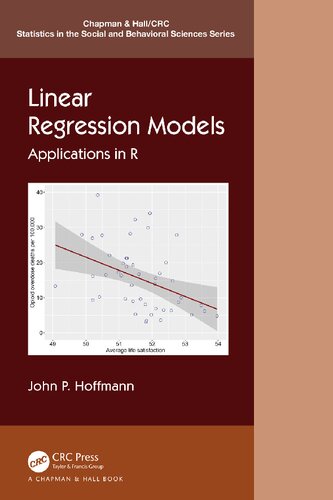

Most ebook files are in PDF format, so you can easily read them using various software such as Foxit Reader or directly on the Google Chrome browser.
Some ebook files are released by publishers in other formats such as .awz, .mobi, .epub, .fb2, etc. You may need to install specific software to read these formats on mobile/PC, such as Calibre.
Please read the tutorial at this link. https://ebooknice.com/page/post?id=faq
We offer FREE conversion to the popular formats you request; however, this may take some time. Therefore, right after payment, please email us, and we will try to provide the service as quickly as possible.
For some exceptional file formats or broken links (if any), please refrain from opening any disputes. Instead, email us first, and we will try to assist within a maximum of 6 hours.
EbookNice Team

Status:
Available0.0
0 reviewsResearch in social and behavioral sciences has benefited from linear regression models (LRMs) for decades to identify and understand the associations among a set of explanatory variables and an outcome variable. Linear Regression Models: Applications in R provides you with a comprehensive treatment of these models and indispensable guidance about how to estimate them using the R software environment.
After furnishing some background material, the author explains how to estimate simple and multiple LRMs in R, including how to interpret their coefficients and understand their assumptions. Several chapters thoroughly describe these assumptions and explain how to determine whether they are satisfied and how to modify the regression model if they are not. The book also includes chapters on specifying the correct model, adjusting for measurement error, understanding the effects of influential observations, and using the model with multilevel data. The concluding chapter presents an alternative model―logistic regression―designed for binary or two-category outcome variables. The book includes appendices that discuss data management and missing data and provides simulations in R to test model assumptions.
Features
The book is aimed primarily at advanced undergraduate and graduate students in social, behavioral, health sciences, and related disciplines, taking a first course in linear regression. It could also be used for self-study and would make an excellent reference for any researcher in these fields. The R code and detailed examples provided throughout the book equip the reader with an excellent set of tools for conducting research on numerous social and behavioral phenomena.
John P. Hoffmann is a professor of sociology at Brigham Young University where he teaches research methods and applied statistics courses and conducts research on substance use and criminal behavior.